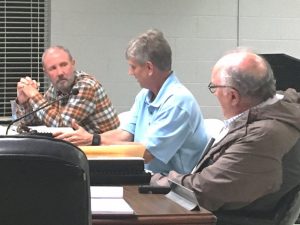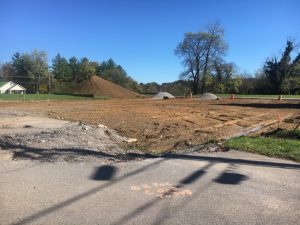October 31, 2020
By: Dwayne Page
City leaders and the contractor are seeking common ground on a plan to resume construction of the new Smithville Police Department building.
Construction recently ground to a halt only weeks after groundbreaking when areas of unsuitable soils were discovered on the site. In some places, the ground was too soft to proceed without significant soil removal and replacement which could add an extra $100,000 to the $2.5 million project.
The question is who should address the soil problem, the city or the contractor?
During a workshop and special meeting Thursday night, October 29, the Mayor and Aldermen met with the contractor for the project, Mike Boyce of Boyce Ballard Construction of Murfreesboro along with the city’s architect, Wayne Oakley of Studio Oakley Architects of Lebanon to seek a solution.
Mayor Josh Miller said the city went to great lengths to keep the cost of this project down before and even after bid letting and was assured there would be no surprises and he is frustrated to learn of this latest development.
“When this project started, the bid was right at $2,685,000 so we started cutting things and later the official bid was $2,395,000. We sold bonds for $2.5 million. I remember asking the question at that time is $2.5 million going to be enough money to build this project and maybe put some stock (furnishings) in the police department. That answer was I don’t see why not. I remember that very clearly. Well we haven’t even let the horses out to run yet and here we are asked to take a $100,000 hit. The cushion would be gone if this were our (city’s) part to pay,” said Mayor Miller.
The city’s position is that Boyce Ballard Construction bears the responsibility since the soil condition was identified in a geotechnical report prior to bid letting and that the intent of the contract documents was for any unsuitable soil removal and replacement to be included in the bid and contract amount. In other words, the contactor should have been aware of the soft soils issue and taken that into consideration when bidding on the project.
Ballard said he thought the cost or unit price for “undercutting” (replacing unsuitable soils) was to be added by the city after the bid because it was impossible for him to know the extent of the problem beforehand. Ballard also claims he never intended to walk away from the project and that he stopped work only until a solution could be found.
“When we did a proof roll and found out we had unsuitable soils we stopped work as the contract tells us to do. We notified (architect) Wayne (Oakley) and we had to get GEO Services for a recommendation on how to resolve it. We had no desire to halt the project. We want to continue and try to find common ground but I didn’t realize this was an issue until I received the letter from Wayne stating that you (mayor and aldermen) felt like it was our responsibility,” said Ballard.
“If you look at the contract and the price given for excavation the concern we have is that from day one there was a concern about soft spots in the area based on the evaluation of Geo Services and our understanding of the contract is you (Ballard) were to come here, evaluate the soil and the situation, and determine whether to increase the bid for the foundation of this building. My opinion is that the contract is written in such a way that you should be responsible for the removal of that soil and establishing sufficient foundation and work,” said City Attorney Vester Parsley.
Reading from the geotechnical report, Oakley said during a city council meeting on October 22 that “soft surface soil conditions were encountered in three of the soil test borings at depths ranging from 1 to 7 feet below the existing ground surfaces and these soil zones could potentially impact the performance of the building’s concrete slab foundation in the parking and drive areas”. The report went on to state that “we anticipate that some of these soft soils will be encountered and will require undercutting and replacement”.
After being notified by letter from the architect Monday (October 26) of the city’s position on the issue, Ballard responded with a letter of his own also quoting from the geotechnical report stating that “for bidding purposes, we recommend an allowance for undercut be provided and some consideration be given to the associated unit rates for undercutting,”. Based on this statement, Ballard wrote, we assumed that the architect or owner (city) would include an estimated quantity of undercutting and base their selection of the apparent low bidder with each unit price provided.”
Unit price bidding allows designers, consultants, and/or engineers to build in project contingencies for any unknown items that may occur during construction.
“It is best practice in the open bid market to provide bidding documents that are clear and concise for a fair and equal bidding opportunity for all competitive bids. The reason for a Design-Bid-Build type of project is so that each contractor has the same opportunity to bid the same things as all other competitively bidding contractors. No one can determine what is below the ground surface except for the location of the boring”.
Again referring to the geotechnical report, Ballard wrote “Information on actual subsurface conditions exists only at the specific boring log locations and is relevant to the time the exploration was performed. Variations may occur and should be expected between soil test boring locations”. It goes on further to state that “The stratification lines were used for our analytical purposes and, unless specifically stated otherwise, should not be used as the basis for design or construction costs estimates”.
“We clearly are not trying to get paid twice for the undercutting of unsuitable soils and are being as open and transparent as possible with you and the owner (city). We are anxious to get back to work on this project,” wrote Ballard.
During Thursday night’s meeting, Ballard said he might consider splitting the cost with the city for resolving the unsuitable soils issue.
City Attorney Parsley and Architect Oakley have recommended the city pay no more for addressing the unsuitable soil issue and leave that responsibility with the contractor.
The aldermen tabled any further action until Monday night’s regular monthly meeting, November 2 at 6 p.m. at city hall.





